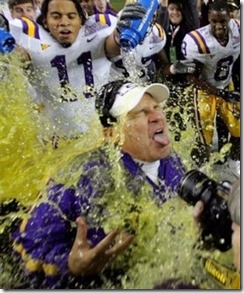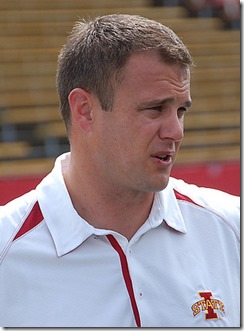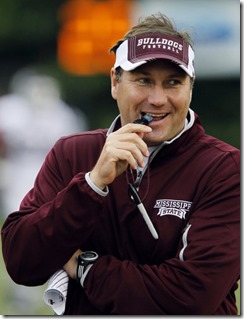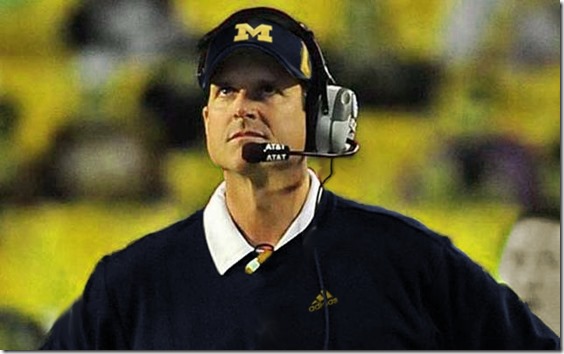You're going to see plenty on these pages about guys we think might coach at Michigan next year, since it's pretty much a sure thing at this point that Hoke will not. I thought it would be as good a time as any to build some sort of consensus of what we're looking for and how much of it we want relative to other factors. Other than, you know. "Jim Harbaugh."
Last week one of the diarists put together a matrix for evaluating the coaching candidates. I didn't like how he weighted the things, so at the time I put together a draft version of a more detailed "what we're looking for" system. I have since overhauled and updated it to be a more accurate reflection of my feelingsball:
The last five Michigan hires are given at the time of their selection to establish a baseline. Some things may seem wonky, like Bo being rather low, but remember his resume was that of an assistant (not coordinator) who'd been successful in the MAC. Some candidates in short:
| Category: | Jim Harbaugh | Dan Mullen | Gary P'son | Les Miles | Mike Gundy | Tom Herman | Bob Stitt | Pat Narduzzi |
|---|---|---|---|---|---|---|---|---|
| Success (25 max) | 43* | 24 | 23 | 42* | 28* | 12 | 12 | 12 |
| Offense (20) | 9 | 14 | 2 | 6 | 12 | 19 | 15 | 0 |
| Defense (20) | 10 | 6 | 13 | 9 | 3 | 0 | 3 | 20 |
| Teambuilding (15) | 11 | 7 | 7 | 11 | 7 | 12 | 5 | 7 |
| Long-Term (13) | 7 | 0 | 2 | -5 | -2 | 3 | 11 | 1 |
| Short-Term (7) | 6 | 3 | 4 | 4 | 3 | 1 | 0 | 3 |
| Attractiveness | 68 | 54 | 51 | 50 | 48 | 47 | 47 | 43 |
* I calculated success but maxed it out at 25, at which point the guy's proven he can coach.
We can change things around but I figured one matrix would be useful for our discussions going forward. At least it passes the eye exam. Kinda. I don't know how to make it stop rating Les Miles so high unless I need to raise the importance of long-term success.
Why the matrix?
Usefulnessis in discussing the particular pros and cons of these guys in context, because things like "is he a culture fit" otherwise tend to outweigh "can he coach football." A brief explanation of my scoring system after the jump.
1. Previous Coaching Success (25 points possible)
This metric is about straight-up previous success. If he's been winning, building programs, and collecting hardware and rings he is already a quarter of the way to a sure thing. I counted accomplishments as a coordinator at 25%; there was a diary in the long long ago that suggested this was a good relative measure for a coordinator who's actually in charge of the side of the ball he's in charge of. Components:
 |
| Number of Gatorade baths should be a metric; number of times the coach then lapped up the spilled Gatorade should not. |
1a. Winning percentage. I love winning man. You know? Like it's better than losing? This is a 10-scale. The formula is all wins as a head coach plus .25 times all wins as a coordinator, divided by wins+losses+1/4 coordinator wins+losses. I take the resulting winning percentage, add a tenth (because winning 90% of your games gets a 10/10) and multiply by 10, rounding up. Winning at a Bo clip gets you an 8/10. Yost would be a 10.
1b. Power 5 bonus. +1 for each winning team, win over 9 in a season, conference title/title game, and BCS bowl.
1c. Builder bonus. For each team he rebuilt, max 10, where zero is he didn't change the team's success rate from when he took over and 10 is turning Indiana into a national power.
1d. NFL bonus. +1 for each playoff win, +1 for each win over 10
1e. Other accomplishments. Like coaching hardware, major upsets, winning the FCS national championship.
It's possible to get over 25 points but this is about whether he'll win at Michigan, not Hall of Fame credentials, so I've capped it at 25. At that point the answer is "yes, the guy can coach."
2. Offense and 3. Defense
This is less of a reward for how good his units have been and more of a way to project how good of an offense he would be able to build at Michigan given past performance. Components:
2a. Expertise. Maximum is 10, which is the league follows whatever he's doing. A 5 is an offense that gets what you'd expect from its talent. Head coaches who haven't coached it are graded on their hires at half rate.
2b. Position. Maximum 3 points for being a whisperer of a certain position, e.g. Brady Hoke with defensive linemen. Certainty principles are good.
2c. Innovation. Max 4 = Inventor. 3 = Early adopter. 2 = Keeps up. 1 = Has heard of it.
2d. Execution. Max 3 = Bo-like rep master who keeps things simple and only plays dudes who get it right. 2 = generally plug & play, 1 = don't notice it, 0 = not a priority. I probably should have allowed for negative points, but only someone who's seen Michigan's current coaching staff would ever believe in it.
 |
| You get more points for winning national recruiter of the year awards while owning the Midwest than for being raised here. |
4. Team Building
Mostly recruiting, but a third of it is development. Recruiting is split into midwest and nationally. Components:
4a. Midwest Recruiting. How well does he know the home front, especially Michigan and Ohio coaches. 5 = Local HS coaches will mention his name unbidden. 3 = Has good ties. 1 = Has only pulled a few recruits from the B1G footprint.
4b. National Recruiting. The corollary to the above. 5 = HS kids mention his name with reverence. 3 = Regularly extends footprint and brings in national blue chips.
4c. Development. A catch-all for whether players tend to play up to/meet their potential. Tendency to redshirt and retain players, and plays a lot of upperclassmen. 5 = Mentally add a star, 4 = Add half a star, 3 = Lots of outperformers, 2 = Regular outperformers, 1 = Some successes.
5. Long Term Program Health
Things are definitely desperate enough that Michigan would take a stop-gap solution and expect to be looking for a successor in a few years; that's a few years of not this. But ultimately coaching transitions are bad, and should be avoided at all costs, as should the things that tend to initiate coaching searches or damage programs down the road. Like…
5a. Will he last? I put this on a scale of +4 to –4, based on age and where he's at in his career (e.g. if he may use success to move on to the NFL). A –4 is a guy already on his downswing; a +4 is a guy not yet 40.
5b. Not a dick? Fuzzy wuzzies win you points at Michigan. A 3 is a loveable bear who walks in saying "Michigan fergodsakes," a 2 is a genial dude, a 1 is a dick but only in a good way, and a 0 is a typical football coach.
5c. Culture fit? Again I'm tempted to include a minus level here because Rodriguez, but I gave nobody negs. A +3 is a guy who knows all the factions already and can walk in and placate them, a 2 is a good fit, a 1 has only some small natural enemies, and a 0 is a stranger who'd have to make his own good will.
 |
| Is Mullen's Rodriguezity a concern? What's good for the future only matters if he can get there without the self-appointed caretakers of "Michigan Man" ripping it from him first. |
5d. Ethics. This one is a scale of dirtiness or cleanliness. A +3 is Beilein, +2 = good guy, +1 is no problems, 0 = typical, -1 = occasional whiff of a violation, -2 = so what?, and -3 = a concern.
6. Short Term Program Health
Can he save the recruiting class, tack on some late great pickups, keep the team together, and win with what's on hand? Because we'd like to win sooner rather than later.
6a. Hotness. Picking up a big name will stir the positive feelings for the school, lead to big donations, and create an atmosphere of general not like now.
6b. Fit for current talent. Michigan's been running zone this year so they can probably do either that or man blocking; the greater concern is quarterback. Rich Rod wouldn't be a great fit for the guys on the roster now because of that. This is a 4 scale but I was pretty lenient on all but super-spread-to-run guys because of the versatility of the current roster.
6c. Attrition. This is a guess based on feelings and stuff but a legit concern. I only gave out at worst a –2 on a scale of zero to –4. Zero means the hire solidifies the guys with a foot out the door, a –2 means the loose threads snap, and –4 is a mass exodus.
